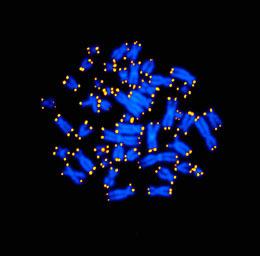 Protecting chromosome tips doesn't just prevent ageing. It can reverse it.Peter Lansdorp/Visuals Unlimited/Corbis
Protecting chromosome tips doesn't just prevent ageing. It can reverse it.Peter Lansdorp/Visuals Unlimited/CorbisPremature ageing can be reversed by reactivating an enzyme that protects the tips of chromosomes, a study in mice suggests.
Mice engineered to lack the enzyme, called telomerase, become prematurely decrepit. But they bounced back to health when the enzyme was replaced. The finding, published online today in Nature1, hints that some disorders characterized by early ageing could be treated by boosting telomerase activity.
It also offers the possibility that normal human ageing could be slowed by reawakening the enzyme in cells where it has stopped working, says Ronald DePinho, a cancer geneticist at the Dana-Farber Cancer Institute and Harvard Medical School in Boston, Massachusetts, who led the new study. "This has implications for thinking about telomerase as a serious anti-ageing intervention."
....
To find out if these dramatic effects are reversible, DePinho's team engineered mice such that the inactivated telomerase could be switched back on by feeding the mice a chemical called 4-OHT. The researchers allowed the mice to grow to adulthood without the enzyme, then reactivated it for a month. They assessed the health of the mice another month later.
"What really caught us by surprise was the dramatic reversal of the effects we saw in these animals," says DePinho. He describes the outcome as "a near 'Ponce de Leon' effect" — a reference to the Spanish explorer Juan Ponce de Leon, who went in search of the mythical Fountain of Youth. Shrivelled testes grew back to normal and the animals regained their fertility. Other organs, such as the spleen, liver and intestines, recuperated from their degenerated state.
Nature Article